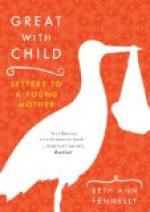This important ingredient in human happiness, and especially in the happiness of the young mother and her tender infant, can usually be had within doors, if pains enough be taken. But if the weather is fine and in every respect favorable, a woman who is in tolerable health may venture abroad a little in about three weeks after her confinement, and sometimes even in two. Whether her exercise be without or within doors, however, she should be effectually protected against chills, and against the influence of currents of cold air.
It has been incidentally stated, that Dr. Dewees objects to the mother’s use, during her early period of nursing, of broths and animal food. This is about as much as we could reasonably expect from one who belongs to a profession whose members are, almost without exception, enslaved to the practice of flesh-eating. But even this advice of his, if duly followed, would be a great advance upon the practice which generally prevails. There is so universal a belief among females that they demand, at this period of their existence, not only a larger quantity of food than usual, but also that which is more stimulating in its quality, as almost to forbid the hopes of making much impression upon their minds. Many young mothers seem to consider themselves as licensed, during a part of their lives, not only to eat immoderately, and even to gluttony, but also to swallow almost every species of vile trash which a vile world affords.
How long will it be, ere the mother can be induced to take as much pains to select the most appropriate and most healthy aliment for herself and her child, as she now does that which is demanded by a capricious appetite, without the smallest reference to fitness or digestibility! How long will it be ere the mother can be brought to believe and feel that, in every step she takes, she is forming the habitation of an immortal spirit—a spirit, too, whose character and destiny, both present and eternal, must depend, in no small degree, upon the character of the dwelling it occupies while passing through this stage of earthly existence! How long will it be, before mothers can be made to believe even these two simple truths, that the nourishment, which the human being actually receives, is not always in exact proportion to the quantity of nutritious food which he throws into his stomach, and that the diet is always best for both mother and child, which is least exciting.
The Charleston Board of Health, during the existence of cholera in that city in 1836, publicly announced that the “best food is the least exciting,” and this great truth is just as true in all other places and circumstances on the globe as it was then in South Carolina. And though I am far from believing that health depends more on food and drink than on all other things put together, as many seem to suppose, yet I am entirely of opinion that he who should devote himself successfully to the work of applying this truth, in all its bearings, to the dietetic practice of all mankind, would do more for their reformation—yes, and their salvation too—than has yet been done by any merely human being, since the first day of the creation.




